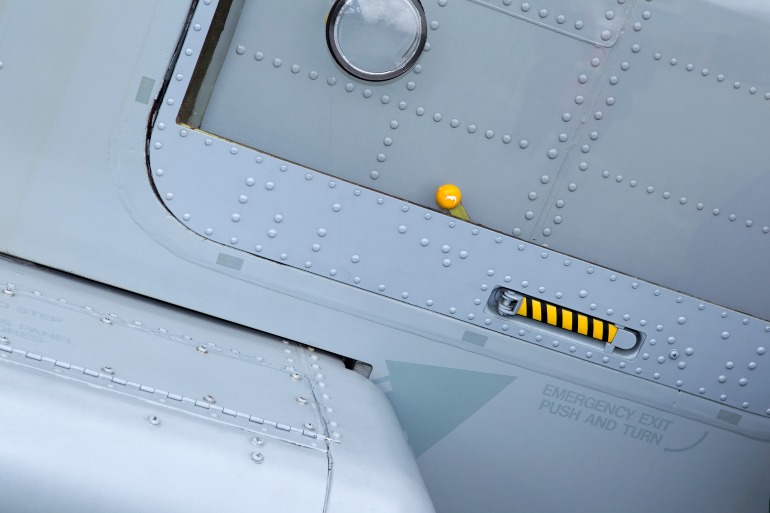
In the 1480s, Leonardo da Vinci drew over 100 illustrations that constituted the first real studies on human flight. One of these, a pen-and-ink sketch of a flying machine similar to a modern helicopter, contained what da Vinci called an ‘aerial screw’ – perhaps the first true aircraft fastener type, similar to a water screw but working in the air instead of water.
Fast forward 541 years and the number of domestic and global airline flights worldwide is an estimated 22.2 million (in 2021). And with the demand for more affordable flights, the aerospace industry is growing at a rapid pace – and with it, the need for more specialised aircraft fastener types.
The number of aircraft fasteners (bolt or screws, rivets, etc.) that hold a plane together is immense; for example, a Boeing 747 uses over 200,000 fasteners and fastener covers. But what are aircraft fasteners, and why are they so important?
Simply put, fasteners join parts of an aircraft and work like the studs on a piece of clothing. Rivets in a plane, for example, secure the aluminium panels to the fuselage, while steel bolts connect the wing to the aircraft body.
Performance characteristics
The main end-use sectors of aerospace fasteners are commercial and military aviation. The aerospace fastener market also services space applications, where fasteners face the high pressures and demands of leaving the earth’s atmosphere (as well as the elevated temperatures of burning huge amounts of kerosene).
Aircraft fasteners must also be resistant to both tension and shear forces (such as the pressure of air flow over an aeroplane wing). These forces are exerted on the fastener in all directions – sometimes at right angles.
Many aircraft fastener types are used in the aerospace industry, each with its own functionality and feature.
JP Aero is a long established aerospace and industrial fastener manufacturer and distributor. We carry over 35,000 lines and can handle orders of any size. Download our stock card for a more detailed look at our inventory.
Aircraft fastener types
To meet the stringent standards of the aerospace industry, fastener manufacturers use high-performing alloys to create the pins, rivets, screws, nuts and bolts needed for aircrafts. These specialised fasteners connect aeroplane parts together in primary (fuselage, wings, empennage, landing gear and powerplant) and secondary (not primary load carrying sections) structural areas.
Many different aircraft fastener types are used in the aviation industry to secure an aircraft. Some of the more common fasteners include those that secure the wings, which must be able to hold the weight of the entire aircraft. Taken together, fasteners constitute a fair amount of weight and directly affect the structural strength of commercial and military aircrafts.
By product, each aircraft fastener contains many more sub-types. Take a simple rivet, for example. Rivet fasteners include semi-tubular, solid, blind, split, drive and many other highly versatile rivet types.
The fuselage segment is expected to lead the aerospace fastener market during the next few years. The fuselage comprises the frame and skin of an aircraft and is one of the key applications of aerospace fasteners, and the fuselage must be assembled using high-strength fasteners. The increased demand for new aircraft deliveries is projected to drive the growth of the fuselage segment.
High performance alloys – fastener strength and safety
Aerospace applications require high strength-to-weight ratio fasteners for better performance and to avoid weight penalties. High performance alloys (HPAs), or superalloys, exhibit key characteristics (high-temperature and corrosion resistant with good mechanical strength), making them perfect for use in highly demanding applications in the aerospace industry.
The measure of an aircraft fastener’s strength is its ability to resist tensile stress and shear force – fastener material, configuration and the manufacturing process all determine the resulting strength. The A193 specification for threaded fasteners, for example, covers use in high temperature and high pressure applications, while the A320 specification covers low temperature applications. Both grades, however, are made from corrosion resistant steel, but only the A193 is suitable for use in aircrafts.
In aircraft construction, safety is always the top priority, and a fastener’s strength is an important safety consideration. When you build an aeroplane, it’s important to ensure the parts fit well together and are strong enough to withstand certain loads. If they are not, the entire structure could come apart mid-flight, obviously posing serious threats to the safety of the passengers and crew.
Aerospace manufacturers find certain fastener materials more desirable because they are lightweight yet strong and durable. Common materials used for fasteners for aerospace applications include aluminium, carbon steel, titanium and superalloys. Fasteners made from titanium offer an excellent strength-to-weight ratio, making aircrafts lighter and more fuel efficient – without sacrificing safety.
A growing market
The aerospace fasteners market is expected to reach $14.39 Billion by 2030 and register a compound annual growth rate of 6.8% according to the latest report.
The rise in international and domestic tourist air travel, the favourable government policies to enhance air transport infrastructure and rising space exploration activities are the driving factors behind the market growth.
However, rising concerns over fuel efficiency and emission levels are impelling airlines to opt for lighter materials, which will likely create a demand for fasteners made of titanium and aluminium.
The market is driven by the need for faster assembly and disassembly of aircraft components, as well as the increasing demand for lightweight fasteners that reduce fuel consumption.
The Asia-Pacific region (China, Japan, India and South Korea) is likely to be the fastest-growing market for aerospace fastener types over the next few years.
(CTA) JP Aero is one of the foremost providers of aircraft fastener types in the UK and one of the first distributors to obtain BS5750 approval (a national standard for quality management). Click here for more news on the aerospace industry, or contact us for more information.
